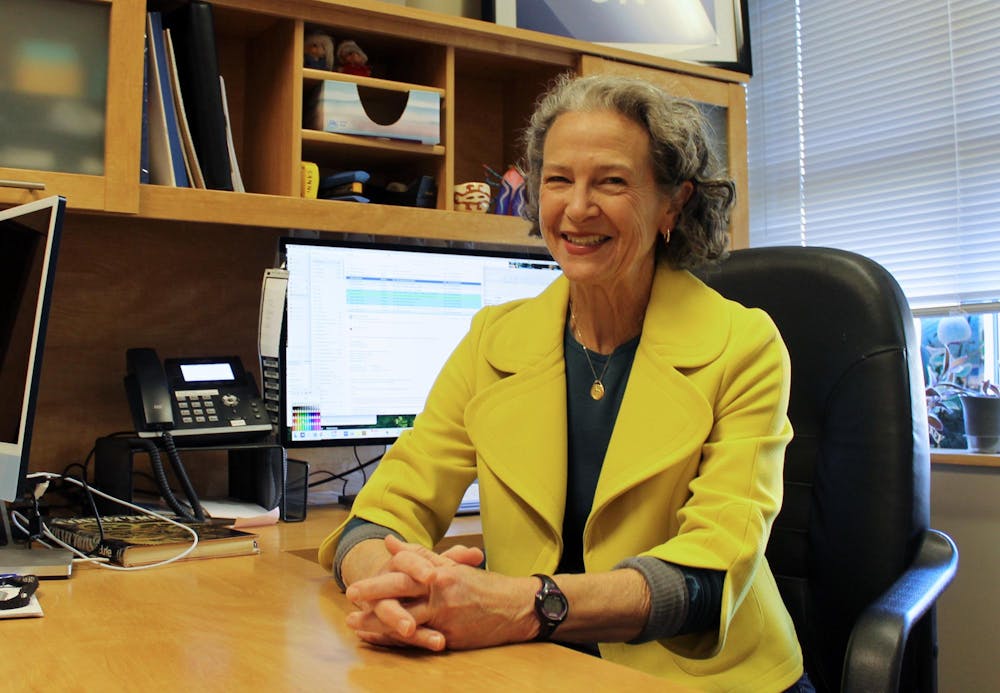For many kids, the library or park can only hold their attention for so long. Enter Bloomington’s WonderLab Museum of Science, Health and Technology: a place for children to interact with exhibits stimulating curiosity and fueling imagination since 1998. As part of the museum’s 2024-2026 Strategic Plan, founding member and current executive director Karen Jepson-Innes has decided to retire. This plan contains four focus areas: new leadership, financial stability, inspire a lifelong science engagement and a commitment to planetary health.
Jepson-Innes said her love for science began as early as high school.
“It was a really great high school biology teacher that started this journey, and he brought in really authentic materials into the classroom, like a live snake,” Jepson-Innes said.
She studied biology in college and worked as a career in park interpretation soon after. Later, she left her job to get her master’s degree in insect ecology.
Her hands-on experiences with science as a student in the classroom became part of her inspiration behind WonderLab. She also wanted to find something for her, at the time, three-year-old daughter to do.
“There was really not very much to do in Bloomington for kids that age,” Jepson-Innes said. “So, we took our daughter up to the Children's Museum up in Indianapolis, and they had this room that was specifically for preschoolers called Playscape.”
She felt Bloomington needed a space like Playscape. Around the same time, a group of community members started talking about the WonderLab Project. This Bloomington-based project began as a traveling science outreach program dedicated to bringing science to schools and other community spaces.
“I went to one of the early meetings and things went along, but that's how I got involved,” Jepson-Innes said. “I felt the personal need for what something like WonderLab in our own town could do for our community.”
Jepson-Innes became the founder and face of Wonderlab, and she worked very closely with the late executive director, Catherine Olmer, on exhibits and programs, as well as writing grants and meeting with donors. Gaining the title of executive director came with the responsibility of overseeing development of the strategic plans, caretaking staff resources, helping with funding and working on new exhibits.
“What she brings to the museum as a scientist is obviously a love for following the mystery, asking the questions, digging deep, looking at data and running experiments,” Aleisha Kropf, the Director of Marketing and Communications said. “Something we embrace here at WonderLab is that there's not a right and wrong way to do things. It's experimenting and testing to see what you can find.”
While scientists are responsible for experimenting and being flexible in their studies, the role of executive director called for the same things. Kropf said Jepson-Innes was flexible when it came to pay equity among museum staff.
“We had to move from ‘nobody gets paid’ to ‘we need to hire people who actually expect to get paid,’ and she has advocated strongly for that,” Kropf said. “She has helped WonderLab’s pay scale move to meet the needs of everyone.”
During Jepson-Innes’s time at WonderLab, the COVID-19 pandemic took a toll on businesses. However, she worked closely with staff to rework financials during this time instead.
“We reworked our staff payment structure and put a lot more financial resources towards our front of house staff,” Jepson-Innes said. “It seems kind of ironic, but during that time of financial scarcity, we elevated staff salaries to a level that we had been trying to achieve for many years.”
Jepson-Innes’s priority as a director has always been sustaining WonderLab’s presence in the community.
“She just showed a real flexibility in thinking about how we could remain a viable organization, how we could keep our members and donors happy,” Kropf said.
Jepson-Innes said one of her favorite memories at WonderLab was when it provided a space in the building for Bloomington High School South students to paint a mural using a heat reflective paint the students had developed. The students received the Samsung Sustainability Innovation Award in 2023, which is given to winners of a STEM competition based on social impact projects.
“I was talking to one of the high school students, and she said, ‘I grew up at WonderLab, and it was my science home,’ and I thought, ‘that's it,’” Jepson-Innes said. “That summarizes what we could have hoped for that way back in the day. She developed her identity as a scientist here.”
Over time, Jepson-Innes began seeing people who were children come back to WonderLab as parents. This solidified the idea that her time at WonderLab made a difference in the community. Now, she’s ready to move on and retire.
“I'm staying in town, but I have two grandkids, so I'm looking forward to spending more time with them,” Jepson-Innes said. “I’m going to do some traveling, and more of the things that that I love, like long hikes. But I do expect and hope that I will find some connection to my professional career going forward.”
As for WonderLab, Jepson-Innes said she hopes it stays true to its roots.
“I hope it stays the same in a lot of ways, and it's in its core ways of just inspiring delight and wonder for visitors of all ages,” Jepson-Innes said. “What I what I want to see going forward is that it will be a career building place for leaders of the future.”
The next executive director, expected to be named in March, will follow the legacy of Jepson-Innes, but she does have a bit of parting of advice for whoever will take her place.
“Never give up,” Jepson-Innes said.




